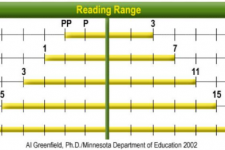For Teachers: The Five Senses

How many senses do human beings have?
If you said “as many as two dozen,” you are correct!
Some of them (for example, sensory awareness of hunger and thirst) are still questionable. And, no, common sense did not make the resource lists we consulted at all.
For the purpose of this post, we will focus on […]
Tip for Teachers of ELLs: Parent Survey
The following information can help teachers of English Language Learners (ELLs) prepare appropriate instruction for their students and across their classrooms. Prepare a one-page parent survey in order to collect background information about each ELL. Some good things to ask about include:
Age of child on arrival to United States
Date of arrival
Circumstances […]
Range of Readers in 1 Classroom

For any teacher it is critical to recognize that in any given classroom, the range of reading ability is approximately 2/3 of the students’ chronological age. This means that in a classroom of mostly 15 years old, the range of reading ability, and “inability” across the class will span 10 years!
In […]
Education History in the ELL Classroom
The educational backgrounds of English Language Learners (ELLs) can vary widely. Some have received good educations in their countries of origin, and this experience will help them succeed in their new schools. Some even have more advanced academic skills than many students in U.S. “gifted and talented” programs […]
Reading: What do you ALREADY know?

To better understand how reading skills are built on prior knowledge and experience, consider this metaphor: Our brain acts like a file cabinet.
The brain food we receive as babies gives us words that we use to communicate. This is what makes each of us unique. As our brain makes more […]
Immigration History in the ELL Classroom
English Language Learners (ELLs) range from those who are newly arrived in the country to those who have lived in the United States a while. Some students learning English may even have been born in the Unites States. They would still be considered ELLs if they have been primarily exposed […]
Sound Reading Development

There are several reasons why all educators should be aware of best practices in reading instruction. One of the arguments is that sound reading enables improved student understanding across all content areas.
Every teacher involved in a student’s life is responsible to reinforce good reading skills. […]
English Language Learners in the Classroom

Getting to know each student is one of the first steps in providing a welcoming classroom environment for all, and good teachers recognize and celebrate the fact that each of their students are individuals.
It is important NOT to assume that all English Language Learners (ELLs) will learn in the same […]
Research on Reading

Research has been proven useful in making the connections between language exposure and reading abilities.
In a longitudinal study conducted at the University of Kansas, 6 month old babies were observed until they were three years old. Researchers recorded what occurred around the baby for one hour each month. These […]



